#2018 Asian Games
Explore tagged Tumblr posts
Text
it's been like. 5 years, since asian games 2018 and i still think most of its tracks are bangers
#artsy's posts#asian games#thought abt dance tonight just now#and it just kinda#made me realise how much i love the track for asian games 2018#(... i have a really hot take for it admittedly but#ill keep it to myself for now)
1 note
·
View note
Text
How many players are there in Kabbadi team?
How many players are there in Kabbadi team? A. 5 B. 7 C. 9 D. 12 (more…) “”
View On WordPress
#kabaddi asian games 2018 result#kabaddi at the 2018 asian games#kabaddi court#kabaddi final match highlights 2020#kabaddi game#kabaddi in asian games#kabaddi kabaddi#kabaddi live#kabaddi live score#kabaddi mat shoes online#kabaddi match#kabaddi match video#kabaddi olympics#kabaddi rules#kabaddi season 6#kabaddi shoes#kabaddi sport
0 notes
Text
Women in Politics: Urgency of Quota System For Women In Regional Elections
Women in Politics: Urgency of Quota System For Women In Regional Elections
Dropcap the popularization of the “ideal measure” has led to advice such as “Increase font size for large screens and reduce font size for small screens.” While a good measure does improve the reading experience, it’s only one rule for good typography. Another rule is to maintain a comfortable font size. Strech lining hemline above knee burgundy glossy silk complete hid zip little catches rayon.…

View On WordPress
0 notes
Text










@giftober 2024 | day 16: lights ➛ fireworks in film & tv
Brokeback Mountain (2005) // Mamma Mia! Here We Go Again (2018) // Red, White & Royal Blue (2023) // Bridgerton (2020–) // Crazy Rich Asians (2018) // Twisters (2024) // The Great Gatsby (2013) // Sense8 (2015–2018) // The Hunger Games: Catching Fire (2013) // The Buccaneers (2023–)
#filmedit#tvedit#brokeback mountain#mamma mia#rwrb#bridgerton#crazy rich asians#twisters#the great gatsby#sense8#thg#the buccaneers#filmgifs#moviegifs#giftober2024#creations*#flashing cw#fireworks cw
145 notes
·
View notes
Text
❝ “Columbia now nine times the speed of sound.” “Roger that, Dan, I’ve got a solid TACAN locked on, uh, TACAN twenty-three.” “The, uh, tracking data, map data and pre-planned trajectory are all one line on the block.”
These authentic samples of communication between NASA and astronaut Dan Brandenstein on the space shuttle Columbia place us in orbit around our planet. Kate has said of “Hello Earth,” “…this is the point where she’s so weak that she relives the experience of the storm that took her in the water, almost from a view looking down on the earth up in the heavens, watching the storm start to form - the storm that eventually took her and that has put her in this situation.” Our narrator is having another out-of-body experience but this time it’s not nearby, on terra firma, but literally out of this world, and it seems to be final. She is high up above our earth, looking down, and there is a shocking sense associated with that as so few human beings have ever left our world to look back on it. There is a disconnection from what is common, known. I am reminded of The Overview Effect, the very real psychological and cognitive shift experienced by astronauts and cosmonauts—anyone who has left the planet and gone a sufficient distance to look back and perceive our planet not as a familiar home, but as a tiny, fragile ball, barely protected by a thin membrane of atmosphere. This awed feeling is described as one of ultimate compassion and understanding of the imperative to preserve and safeguard the planet.
After the NASA samples, we join our narrator floating in space like the Star Child in “2001: A Space Odyssey,” of the earth, but no longer attached to it, in fact freed from it. The tether has been cut. She is detached from her life and its meaning: there is an innocent, bemused approach as she plays a little game. She is so far from home, she can hold up one hand and block the planet from her field of vision—the earth is a toy. And we shift place, time, and point of view (as Kate so often does in her music) to our narrator driving home in a car at night, looking up at the sky, her loved one asleep on the seat beside her (a sweet, gentle, highly cinematic image, and all the more moving when we understand where our narrator currently is and the loss ahead), when she sees something bright streak across the sky. As she watches it shoot through the stars, she sings, amazed, “Just look at it go!” And what is “it?” Shooting star? Satellite? Space shuttle? A “little light?” If all time is simultaneous, has she glimpsed her own soul shooting past the planet? It is her own little light, a mind-boggling and heartbreaking idea—the cry in her voice when she sings this line indicates that she understands the meaning of this object, and its finality.
At this point, something very unexpected happens. An ethereal, arresting male choir sing a passage based on a traditional Georgian folk song from the Kakhetian region called “Tsintskaro.” It is a shocking transition, one that makes us hold our breath so as not to disturb this sudden, delicate, transcendent moment. Kate on the men’s chorus: “They really are meant to symbolize the great sense of loss, of weakness, at reaching a point where you can accept, at last, that everything can change.”
Our narrator, in full Overview Effect at this point, watches storms form and move to threaten the lives she sees below. She cries out to them in vain, all of them, the sailors, life-savers, cruisers, fishermen, anyone on or near the sea, to protect themselves. We hear in this section a few of the Irish instruments, bringing in echoes of meaning from the previous song “Jig of Life.” Here I am reminded of the idea of the Asian goddess Kuan-Yin, or the Buddhist idea of a Bodhisattva, a human who has attained ultimate awareness (Buddhahood) but motivated by compassion, refuses to leave this plane of reality for the benefit of all sentient beings. Our narrator, moved by the end of her own life, is now able to perceive the ephemeral nature of all creation. Everyone can be exposed to danger, everyone can suffer, everyone can—and will—die. This truth is universal. But she is unable to prevent or stop this truth. No one can.
She then sings a passage that is full of several meanings. She says she was there at the birth, out of the cloudburst, the head of the tempest. This could be the storm that took her, or it could be, from her newly widened perspective of awareness, the start of life itself, the start of the universe. We were all there, we are all made of the matter from a singularity—we are all star dust. The murderer of calm is this physical reality itself. All that is born must die. Entropy exists. She understands this and cries out, “J’accuse.” Hence the ultimate compassion for this tiny little blue ball.
The piece ends with whale song, sounds of radar, and a very mysterious, arcane passage spoken in German which, when translated into English, means “Deeper, deeper, somewhere in the deep there is a light.” In German, the word “tief” can also mean “profound,” and I am reminded of the Latin phrase at the beginning of the Christian Psalm 130 “De profundis clamavi ad te:” “out of the depths I cry out to you.” In the depths of sorrow, in the endless well of suffering, there is a light. Compassion is the light. ❞
via: (x)
#*#wherein someone has managed to perfectly articulate all the reasons why it's /the/ kate bush song. at least to me.#the amount of times that i've flat-out sobbed my heart out to it... wah!
116 notes
·
View notes
Note
Hi, i'm a newish bl drama watcher from thailand that just started watching thai bls. i'm a bit ashamed to say that for a long time as a gay man living here i've been avoiding bl shows like the plague cuz of both the fandom reputation and of misconception from my yaoi era which i leave far behind. i'm just want to ask how did you got into watching thai bls and what were you preconception before you got into it.
Welcome to the Tumblr side of BL fandom. I'd actually like to also hear more of your experience with yaoi and BL as a gay person growing up in Thailand if you're willing to share.
For me, I'm a Black American from the Gulf Coast (the South). I grew up in a Catholic city and spent my entire adolescence in the closet. Despite having a sense of who I was as early as 8 years old, I kept most of that to myself. Because I didn't talk about it much with people, I found out most information about queer media and queerness from the internet.

I entered BL via queer cinema. I think the first explicitly gay character that I remember from TV was Marco from Degrassi: The Next Generation. There were probably others, and definitely more subtle expressions, but when I think about the oldest gay character I remember and connect to, it's Marco. I don't like counting things like shipping Shawn and Corey on Boy Meets World or Tai and Matt on Digimon for oldest gay characters. Sailor Moon can't even count because we got a censored version of it in America.

I got access to satellite television away from observing eyes around age 16 and started watching content on Logo back when they aired gay content regularly. I watched basically whatever I could late at night. It's how I saw movies like Get Real (1998), Beautiful Thing (1996), and Bent (1997). It's also how I saw Queer as Folk (2000-2005) Noah's Arc (2005-06).

After hitting adulthood I mostly got lost in video games and standard American TV for a while, but I did basically show up to any Gay Event in TV. I appreciate that Stef and Lena from The Fosters (2013-2018) were some of the only TV lesbians to survive the horror of 2016.
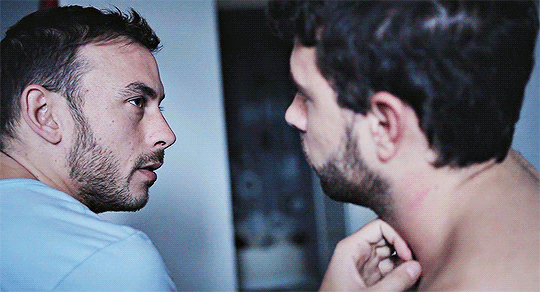
I watched a bunch of movies in this time, many of which appear on the Queer Cinema Syllabus I made for a hypothetical Westerner new to BL and queer cinema, which @wen-kexing-apologist has decided to try to complete.
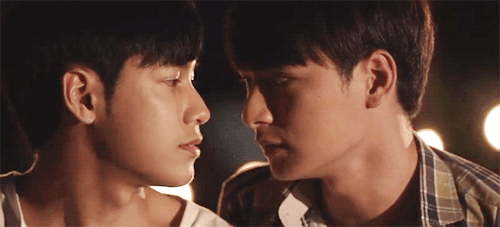
I got into Thai BL in 2018 accidentally. I started seeing gifsets of Kongpob telling Arthit he'll make him his wife passing around Tumblr and was basically like, "Right, what's all this then?"

I had watched a few Thai gay films, mostly notably Love of Siam (2007), Bangkok Love Story (2007), How to Win at Checkers Every Time (2015), and The Blue Hour (2015), but this was the first time I was seeing a long series made available so easily from any Asian country.
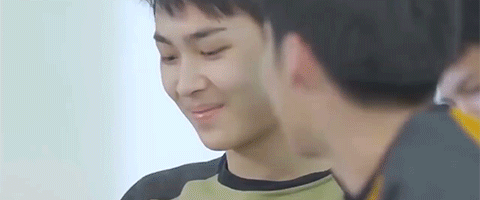
From there I got into Make It Right (2016-17) and Love Sick the series (2014). Once I realized that yaoi had moved beyond manga and a few anime adaptations, I went looking for a lot more. I basically haven't left since I started in about 2016 with SOTUS.
There's my basic entry into the genre. I don't think I was as worried about fandom and worries at the time because so much of being a fan of queer cinema was a mostly-private experience for me for so long. I didn't realize that BL fans active in the space would predominantly be women or queers figuring themselves out. It took a while to adjust to that, and also to adjust my expectations of the kinds of queer stories BL distributors were willing to fund.
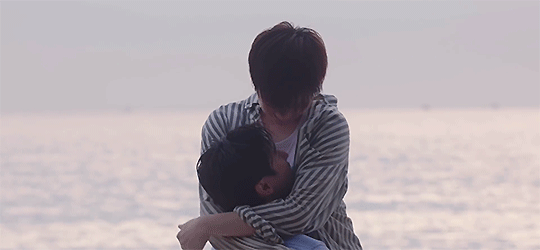
That being said, I tend to agree with @absolutebl that BL has a useful role in normalization for non-queer audiences who encounter it. I like cheering BL when it does things I think work really well, and also deriding it when I think it does things that are offensive to help nudge the genre and offer my perspective as a gay man.
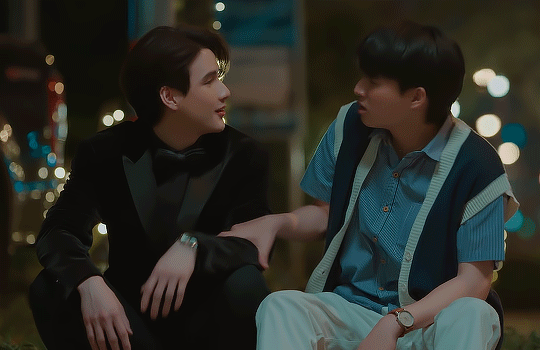
I like the place we're at right now where there's way too much to watch for any person with other hobbies and responsibilities because it means that people can pick and choose what's to their tastes.

More often than not, I'm probably most-invested in something airing from Japan because of my melancholy nature, but there's so much variety these days that it's okay if you don't like everything. I certainly don't!
I'm glad you joined us on Tumblr and look forward to your thoughts!
161 notes
·
View notes
Text
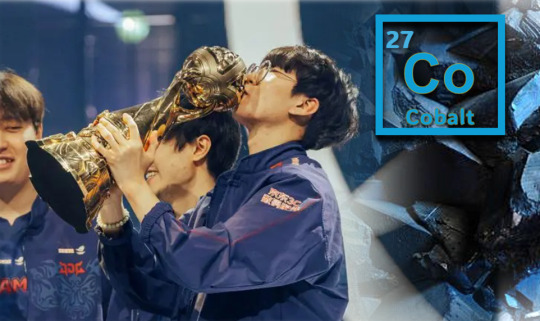
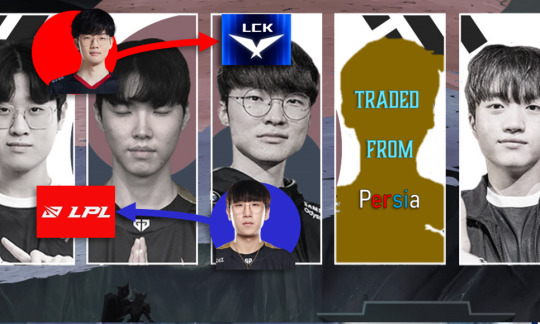
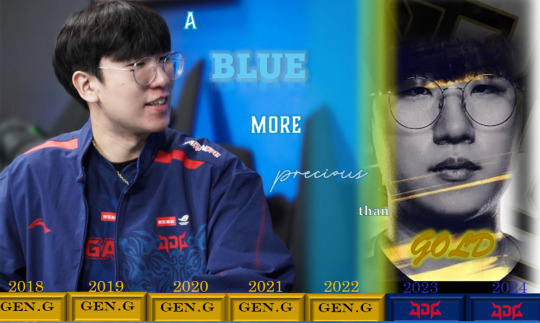

Cobalt is a hard, lustrous metal that is only found within the Earth's crust in combination with other elements. It is light gray in its isolated form, but when ground down or combined, it produces a vibrant blue pigment that has been used since antiquity to color porcelain and glass.
Park “Ruler” Jaehyuk was one of the five original members of Gen.G, with his debut team being the Samsung Galaxy roster that won Worlds in 2017 and was then bought by KSV E-sports. Ruler would stay with Gen.G for the team's first five years, staying long after all of his former teammates left the LCK and gaining a reputation for his fierce loyalty to both the team and the few supports he played beside.
The only other team Ruler has ever played for, excepting his appearances on Team Korea in both the 2018 and 2022 Asian Games, is Jingdong Gaming, an LPL team which he joined in 2023 following EDG Viper's return to the LCK. Before leaving for China, Ruler stated on stream that the only LCK team he ever wants to play for is Gen.G and that Gen.G is the team he hopes to retire from.
Following Ruler's instatement in 2023, JDG was wildly successful, winning the LPL in both spring and summer as well as the Mid-Season Invitational. Ruler is the second player after and only player other than Deft to achieve the feat of winning the LCK (summer 2022), the LPL (spring 2023 and summer 2023), M.S.I. (2023), and Worlds (2017).
Despite originally signing a two-year contract that would keep him for 2025, on October 27th, Ruler officially left JDG. It is yet unknown where he will sign for the upcoming season, though he has suggested that he may be looking to finally return to the LCK.
This post is part of @enarratives’ LoL Esports Elemental Series.
#lolelements#jdg ruler#i really read “a blue more precious than gold for a chinese vase”#and was like... that's just Ruler?#i am very curious where he will end up for 2025#because i know i mention his loyalty here#but i honestly think he might play with another lck team#we shall see
23 notes
·
View notes
Text
Tagged by @babysdrivers, thanks Keeley!!!!
Rules: Make a poll of your Top 5 favourite films and see which one your followers like best!
Tagging: @shovson, @roscoehamiltons, @comraderoscoes, @hungriestheidi, @schumigrace, @rosberggp, @dickinfectionbez, @brawngp2009, @dieschwartzman and @kyogos
#this was very nearly all three of my fave Star Trek films but I managed to restrain myself#(First Contact and The Voyage Home I will still always adore you!!!)#tagged
20 notes
·
View notes
Text

Ri Un Ying, North Korea 🇰🇵
Asian games Jakarta 2018
#rhythmic gymnastics#ri un ying#rg#gymnast#rhythmic gymnast#gymnastics#flexible#beauty#dprk#team north korea#north korea
39 notes
·
View notes
Text

Jung Yoonah (Korean: 정윤아, born November 16, 1998), known professionally as Baebi (Korean: 배바이; Japanese: ベビ), is a Korean singer, dancer, and actress based in South Korea. She is a member of the South Korean girl group Venus, formed by Angelico Entertainment in 2018. She is portrayed by Im Youha & Go Minsi.

Yoonah was born on November 16, 1998, in Guri, Gyeonggi Province, South Korea as an only child. Her mother taught art at a university while her father worked in sales. Yoonah began dancing at the age of three, being put in ballet by her mother.
Yoonah trained in ballet from a young age, having practiced it for eleven years before debuting with Venus.
Yoonah would attend the School of Performing Arts Seoul (SOPA; Korean: 서울공연예술고등학교 / 서공예), where she would be scouted by Angelico Entertainment.

𝟐𝟎𝟏𝟐 - 𝟐𝟎𝟏𝟑 : 𝐀𝐧𝐠𝐞𝐥𝐢𝐜𝐨 𝐒𝐜𝐨𝐮𝐭𝐢𝐧𝐠 & 𝐏𝐫𝐞𝐝𝐞𝐛𝐮𝐭 𝐚𝐜𝐭𝐢𝐯𝐢𝐭𝐢𝐞𝐬.
While attending SOPA, Yoonah would be scouted by Angelico's CEO, Son Jinhwa, and COO, Jeon Jihan, through an open audition the pair hosted at the school. She was scouted for her visual and dancing skills.
Yoonah would become a frequent feature in Priority music videos, acting as a love interest to the boys or as a backup dancer. She would also model for various CF brands and commercials.
In Januaray 2014, it was announced that Yoonah would debut in Angelico's first-ever girl group, Emphasis.
𝟐𝟎𝟏𝟒 - 𝟐𝟎𝟏𝟕: 𝐃𝐞𝐛𝐮𝐭 𝐰𝐢𝐭𝐡 𝐄𝐦𝐩𝐡𝐚𝐬𝐢𝐬, 𝐃𝐢𝐬𝐛𝐚𝐧𝐝𝐦𝐞𝐧𝐭, 𝐚𝐧𝐝 𝐀𝐧𝐠𝐞𝐥𝐥𝐢𝐞𝐬.
Yoonah debuted with Angelico Entertainment's Emphasis on May 21, 2014. Emphasis officially debuted and released their first mini album, EMPRINTSIS, accompanied by the title tracks "Symphony" and "Road Trip."
Emphasis would have their first and final comeback with their second mini album, EMPATHSIS, promoting the title tracks"Love Bomb" and "Wee Woo!" before falling into a year of inactivity.
On May 24, 2016, Emphasis was officially disbanded. Angelico Entertainment announced that Yoonah would be staying with the label.
Following Emphasis's disbandment, Yoonah would return to training and join Angelico's pre-debut team, "Angellies." The group would rotate trainees and perform around South Korea. The team would operate on a ranking system voted on by the fans they would garner from their performances and live streams.
Yoonah was a prominent member of the Angellies, often being voted as the fan favorite in their monthly rankings. By the end of the group's run, Yoonah was the second-most-voted fan favorite.
In 2016, Yuuna would officially take on the stage name Baebi.
In 2017, Angellies would be discontinued to prepare for Angelico's new girl group debut.
𝟐𝟎𝟏𝟖: 𝐃𝐞𝐛𝐮𝐭 𝐢𝐧 𝐕𝐄𝐍𝐔𝐒
On March 17, 2018, Baebi would officially debut in VENUS with the release of their first extended play (EP), SHE DEVIL, and its lead single, "SHE DEVIL."
She is the group's leader, main dancer, main vocalist, and lead rapper.
𝟐𝟎𝟏𝟗: 𝐒𝐨𝐥𝐨 𝐝𝐞𝐛𝐮𝐭
In late 2019, Baebi made her debut as a solo artist with the EP Bubble Pop!. She released her debut extended play (EP), Bubble Pop!, in June 2019. It peaked at number two on South Korea's Gaon Album Chart, and charted atop the US Billboard World Albums. As of 2023, it has sold 360,000 copies in South Korea.
Bubble Pop! 's commercial success was the main contributor to Angelico Entertainment's leading music sales. The song peaked at number one in South Korea, where it has sold over 2.5 million digital units. To accompany her solo release, Baebi held a series of small concerts called Baebi's Summer Splash. She was awarded Best Female Artist at the 2019 Mnet Asian Music Awards and at the 2020 Golden Disk Awards.
𝟐𝟎𝟐𝟏 - 𝐏𝐫𝐞𝐬𝐞𝐧𝐭: 𝐀𝐜𝐭𝐢𝐧𝐠 𝐃𝐞𝐛𝐮𝐭 𝐚𝐧𝐝 𝐜𝐨𝐦𝐦𝐞𝐫𝐜𝐢𝐚𝐥 𝐬𝐮𝐜𝐜𝐞𝐬𝐬
She made her acting debut in the 2021 Netflix K-drama Squid Game, in which she played Han Doyun, an unpaid intern at an unnamed company, alongside her husband, Han Wonil, played by Jang Kiha of Priority, who need money to pay off their ever-mounting debt.
Doyun became a fan favorite, and Jung was called Squid Game's breakout star by critics. For her performance on the show, Jung won the Screen Actors Guild Award for Outstanding Performance by a Female Actor in a Drama Series at the 28th Screen Actors Guild Awards.

Baebi has had a controversial relationship with Mydol CEO Son Jinhwa. An anonymous source revealed the pair's relationship to the public in 2022, resulting in a wave of backlash that led to Jinhwa stepping down from his position as CEO of Angelico Entertainment and Baebi going on a brief hiatus. The pair never confirmed their relationship.
In 2023, Baebi would confirm her relationship with Kim Juwon, the lead vocalist of the boy group Priority. The pair had been dating for three years before the announcement, silently putting the rumors of her and Son Jinhwa's relationship to rest. Baebi and Juwon would break up in 2024 after spending five years together.
Baebi has been a vocal mental health advocate, being very open about her struggles with depression and anxiety. She often donates to mental health charities and volunteers at children's hospitals in her spare time.

𝐄𝐧𝐝𝐨𝐫𝐬𝐞𝐦𝐞𝐧𝐭𝐬
In 2019, Baebi became the face of Gentle Monster, a sunglasses and optical glasses brand founded by Hankook Kim, choosing Baebi to represent their brand due to her "hot and cool" image.
On February 2, 2021, Baebi was announced as the face of Chum Churum, a soju brand under Lotte Corporation.
On March 8, Baebi became the advertisement model of HOT6ix, an energy drink brand under Lotte Corporation.
On April 8, Etude House introduced Baebi as their new brand model.
In September 2022, Baebi became a model for the Japanese bathing suit brand KŌRARU.
Baebi has walked in runways for Burberry, Miu Miu, Jason Wu, Chanel, Schiaparelli, Giambattista Valli, Bottega Veneta, Emilio Pucci, Prabal Gurung, Jacquemus, and Tory Burch. She has also appeared in advertisements for Louis Vuitton, Chanel, Hermès, and Bottega Veneta and on the covers of Vogue Korea, Vogue Japan, CR Fashion Book, and Harper's Bazaar Korea.
#╰ * venus : profiles ⧽ burn it to the ground .#fictional idol group#fictional idol community#kpop fanfic#idol oc#kpop oc#fake kpop oc#kpop au#idol au#kpop addition#idolverse#oc girl group#bts addition#fake kpop girl group#fake kpop idol#oc kpop group#stray kids addition
37 notes
·
View notes
Text

Ernie Gawilan is a fighter.
The 30-year-old champion swimmer made a name for himself after competing in the 2016 Paralympics and becoming the first Filipino gold medalist at the Asian Para Games in 2018. Now, he’s in Tokyo for the 2021 Paralympics, where he will compete and carry his country’s flag in the closing ceremony. But Ernie’s first win came in 1991, when he survived an attempted abortion that left him with no legs and an underdeveloped left arm....
19 notes
·
View notes
Text
(We Need to Talk About Narset)

[Left: Narset, Enlightened Master - Livia Prima. Right, clockwise from top left: Sheldon Cooper from The Big Bang Theory, Dr. Shaun Murphy from The Good Doctor, Sam Gardner from Atypical, Spencer Reid from Criminal Minds.]
(This is a re-upload of the original article since there were some formatting issues with the original. You can still read it at this link, but the pictures aren't full resolution.)
This is article is intended to be a primer for my larger upcoming article on autistic representation in Magic.
I found out about Narset in 2018, when I had just started learning about Magic’s lore for the first time. I was overjoyed to see that Magic’s first official autistic character seemed to be the complete opposite of the stereotypical depictions of autism I’d seen in other media. Instead of a nerdy brown-haired white boy, Narset was a 50 year old Asian woman and a badass martial artist. As an Asian autistic kid, I often felt invisible and underrepresented in the media I consumed, so Narset really meant a lot to me.
However, when I actually read Narset’s lore, I was disappointed to find that she wasn’t nearly as revolutionary as I’d thought.
When the Dragons of Tarkir stories were being published in 2015, Doug Beyer, a writer and designer for Magic, confirmed in a Tumblr post that Narset was intentionally created to be an autistic character.
=========
maudlingoblin asked:
hi doug!! reading the new uncharted realms, i felt an enormous amount of sympathy for narset, specifically with reference to the beginning sequence with her as a kid. the restlessness, the sensory overload, the self-distraction with counting and observation - these, to me, heavily code narset as being autistic. i am autistic myself and it would mean the absolute world to me to know that a character in a game i care deeply about is like me, and many other folks. is this something you can confirm?
dougbeyermtg answered:
That was the intent, yes. The most important part of Narset’s character is her amazing mind, which is central to her potential as a powerful Planeswalker and as a pursuer of knowledge — but it happens that she processes information and input differently than a lot of other people. Tarkir denizens might not have a term for the autism spectrum or being neurodivergent or neuro-atypical, but those terms would correctly describe her. In this timeline she is not khan of the Jeskai, but no matter the circumstances, she hasn’t let go of her commitment to seeking her own path to wisdom and truth. Kudos to Creative Team member Kimberly Kreines for exploring this aspect of Narset in her story “The Great Teacher’s Student.”
[https://dougbeyermtg.tumblr.com/post/112727174244/hi-doug-reading-the-new-uncharted-realms-i-felt]
=========
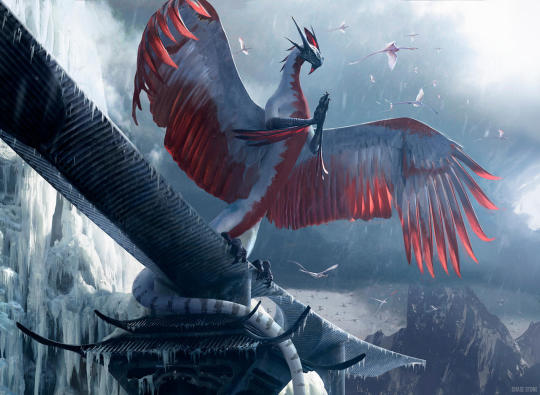
(Art: Dragonlord Ojutai - Chase Stone)
The Great Teacher’s Student tells the story of Narset’s childhood under the rule of Dragonlord Ojutai. At eight years old, Narset was a pretty realistic autistic child, having many traits that I shared. She fidgeted restlessly, had sensory overloads, and her mother found it difficult to take her out to public spaces. Narset’s brain was extremely pattern-oriented, one of the most defining traits of autism. She saw numbers everywhere, and counted to soothe herself.
=========
The cries of the merchants, the bold colors of the wares, and the too-sweet aromas of the produce were like walls that made the marketplace feel too tight, too close, too much. The muscles of Narset’s legs twitched and her lungs felt cramped. She tugged at her robe; it was strangling her. Her mother must have cinched it too tightly.
“Stand still,” her mother scolded from above. “You’ll knock something over.” She was poring over the apples at the top of a tall mound too high for Narset to see.
Narset tried to stand still, but she couldn’t. The restlessness inside her wanted her to move. Sometimes when she felt that way she distracted herself. She would count things, or search for patterns, or study people’s expressions. But she knew the marketplace too well; she knew its numbers and she knew its patrons. She had already taken inventory. The man with the cane was limping less that day, putting more weight on his bad leg; Narset supposed the balm he had purchased from the herbalist the week before had worked to ease the pain. There were, as usual, three dozen meat slabs hanging at the butcher’s stand with an average of eighteen striations per slab; the average number of striations hardly ever changed, although sometimes there was greater variance. The merchant at the squash stand had uneven stains on his sleeves and three stray threads hanging from his robe; he must have gotten it caught in his cart and had to pull himself free. And there were sixty-eight apples in the mound in front of Narset; that was accounting for the volume inside the mound, which she couldn’t see but could predict well enough. There would be sixty-seven apples if her mother would ever just choose one.
Her mother hemmed and hawed, her fingers alighting first on one apple and then another, fluttering over the choices, but never settling.
She’s never going to pick one, Narset thought. We’re never going to leave. Panic set in. Her vision blurred, her ears rang, and her forehead began to sweat. She frantically searched for something else to distract her, but there was nothing else she could see. At eight, Narset wasn’t tall enough to see over any of the stands or any of the bodies. It was like she was in a never-ending maze of tall sweaty, smelly people-trees.
She was trapped.
[The Great Teacher’s Student - Kimberly J. Kreines]
=========
Narset was a believably written autistic character in this story, but that doesn’t automatically mean it was good, or that it was what autistic people wanted to see. To be clear, this story was neither unrealistic nor offensive to me. Writing Narset as an autistic character was something the creative team genuinely cared about and tried to do well. But I was still disappointed because Narset in this story is just another example of the “autistic savant” trope that the media can’t seem to let go of.
Fictional or real, almost every autistic person you will see in the media will be a savant; some kind of socially-inept genius whose intelligence or skill far surpasses their peers. This person may be a mathematician, a surgeon, a child prodigy who attends college but can’t tie their shoes– the list goes on and on. You’ve probably seen many stories like this before.

As a child, Narset had an extraordinary memory and a gift for mental math. She was able to calculate the volume of a pile of apples, find the exact trajectory of a falling apple to catch it in mid-air, and memorize things like the pattern of a river’s flow; all at a glance.
In The Great Teacher’s Student, Narset accidentally knocks over a pile of apples at the market, upsetting the merchant and prompting her mother to send her outside. Dragonlord Ojutai noticed Narset’s talent and desire for knowledge as she explored the field outside, and wanted to encourage her. He tutored her from a distance for several years before officially deciding to train her as a student when she was 11 years old.
After this moment, the story shifts its focus almost entirely to Narset’s academic journey. We get to see that in the years that passed since Narset became a student of Ojutai, she was still really, really smart. She finally felt challenged and supported in the way she needed, and she was good at so many things.
In fact, she was better than everyone else at everything.
She learned more, and faster than everyone else. She won every fight. She spoke Draconic intuitively, and Ojutai constantly praised her. At age 15, Narset became the youngest person to ever hold the rank of Master.
=========
As she looked back now, she recognized her time at the sanctuary as the best years of her life. She was happier than she had ever been; she was challenged, recognized, fulfilled. Her restlessness had ceased haunting her; she had felt a sense of peace. And while she wasn’t physically moving, she knew she was on a path, going where she was meant to go, becoming who she was meant to be. Ojutai was leading her. And not a day went by that she didn’t thank her dragon for the gift.
Narset advanced more quickly than any other student, climbing the ranks of Dragon’s Eye Sanctuary, moving upward from the lowest balconies to the highest terraces, until one day Ojutai called for her to come stand on his own private perch.
[…]
“My student, Narset, it is time. Your hunger for knowledge is your greatest strength. You have become strong, and powerful, and wise because you have never stopped seeking enlightenment.” The dragon beamed down at her. She knew what was about to come, and for one glorious moment everything felt perfect. “I now bestow upon you the title of Master, which you have assuredly earned, and with it all the honor and responsibility it brings.” Ojutai bowed his head and rested his giant paw on her shoulder.
Narset bowed her head in return and clasped her small hand over the dragon’s paw, making no attempt to wipe the hot tear that streaked down her cheek. At fifteen, she was the youngest master Ojutai had ever named. She had reached the top.
[The Great Teacher’s Student - Kimberly J. Kreines]
=========
I didn’t like how Narset’s story focused so much on autistic exceptionalism– on how Ojutai gave her special treatment because she was better than everyone else at everything.
Autistic achievement should be celebrated, and Narset’s desire for endless learning is so deeply, truly autistic. But I feel like Narset’s story and those of other autistic savants are just so extraordinary that it’s too hard to relate to them. These kinds of fictional portrayals and real-world news features attempt to endear autistic people to allistic (non-autistic) audiences by saying, “Look! Autistic people aren’t bad, they’re actually better than us!” But focusing on exceptional individuals doesn’t help to humanize autism.
It sets an unrealistic expectation for autistic people, and can be extremely alienating. Autistic people shouldn’t have to be superhuman to be respected, and the truth is that the overwhelming majority of autistic people are completely ordinary.
When I was diagnosed with autism at age 11, I obsessively searched the internet for information about autism, to learn what other autistic people experienced, and what “normal” people thought of us. I learned that geniuses were loved, and everyone else was hated. I hoped for years that I would magically develop some kind of incredible talent so I could be like the autistic geniuses in the news. I hoped someone would notice me and enroll me in college early or make me famous so I would be respected for something. It didn’t happen. It wasn’t fair to myself, but when I saw stories about savants, I didn’t feel proud to be autistic. Instead, I saw myself as a failure.
Autistic savants don’t need more representation. Most autistic people, even most of the geniuses and prodigies, will never have the kinds of opportunities that Narset and other famous savants have had. But when neurotypical people have only ever seen autistic savants, they expect you to be a genius. And when people expect you to be a genius, being ordinary just makes you a disappointment.
The Magic narrative team clearly recognized the fact that most allistic peoples’ first exposure to autism is through popular media and that it’s a major influence on the audience’s image of what autism is like. So they tried to make a good first impression by making Narset a positive portrayal, but it backfired in one key way: Narset’s writing in this story was so focused on making her as extraordinary and obviously autistic as possible that it neglected to make her a human being. She’s believable, but not compelling. Narset’s story is about an autistic character, but it’s not really about what it’s like to be autistic.
(And I hate to say it, but… there’s nothing revolutionary about making your Asian autistic character a math genius.)
What frustrates me about the way Narset was written is that I actually believe her autism was extremely under-utilized in her writing.
Autism is lifelong, but I don’t really feel like the story treats it that way. Beyond the first scene of Narset as a younger child, the story doesn’t show how Narset’s autism affected her life other than making her really smart.
Upon realizing that Ojutai had nothing left to teach her, Narset became restless and anxious again. She was desperate to learn anything new. When she was 16 years old, Narset discovered the lost history of Tarkir, and it was the possibility of new knowledge that ignited her Planeswalker spark.
Narset’s greatest challenge was that she was literally so good that she couldn’t get any better.
As a child, Narset was shown to have trouble communicating and interacting with others. After Narset became Ojutai’s student, she’s barely shown interacting with anyone other than Ojutai ever again. How did Narset’s differences affect the way she interacted with her fellow students? Did she want to try to make friends? What happened to her mother? How would she have felt about Narset’s progress? The story doesn’t explore any of this. What about her overwhelming sensory overloads? Did she still have them? If so, did her triggers change? She used to soothe herself by counting and finding patterns. When her anxiety returned later in the story, did her coping mechanisms change or stay the same? This isn’t shown, either.
At the end of The Great Teacher’s Student, Narset was still a teenager, but she’s supposed to be about 50 years old now. We know that the present Narset is an independent autistic adult, who has friends and goals and decades of life experience, and that’s beautiful– but we never get to see how she got there. How did she learn to make friends? How did she decide what she wanted to do with her life? That journey is what I want to see being written for autistic characters.

(Art: Quiet Contemplation - Magali Villeneuve)
To contrast, Narset’s story in the Khans of Tarkir timeline does address these things. In Enlightened, Narset is the narrator, and she speaks personally of her challenges as a young autistic person: her academic struggles as a daydreaming student, her feelings of alienation, being bullied, and how she threw herself into her training to cope. These experiences and feelings carried on into adulthood, and influenced the way she approached her responsibilities as the Jeskai Khan.
=========
As a young girl, I had the same “problem,” as my teachers called it. I always lived in my head, but not in the way the instructors wished. I dreamt of fantastical worlds and used the scrolls given for lessons to draw them, incurring the wrath of my elders. I found solace in my own mind and often had difficulty knowing how to talk to others. It was as though my mind was always five steps ahead of my mouth. It was so taxing interacting with others. I never knew what to say, often causing me to blunder, and I was embarrassed in front of my teachers and classmates. I then went over those failed interactions in my mind, and I found the imaginary worlds more forgiving.
Studying was a way to escape my anxiety and I eagerly embraced history and philosophy, memorizing all I could about Jeskai teachings. I impressed my teachers, but I still felt like an outsider. I did enjoy sparring with those who had taunted me, easily humiliating them in combat as they had humiliated me with their words.
[…]
Even though I am now their khan, I still felt like an outsider—like the young girl always fumbling her words—only now I don’t show it. I think this has been what gives me the strength to do what is needed, looking at the Jeskai like I am not really a part of them.
[Enlightened - Matt Knicl]
=========
Overall, I feel like Enlightened was a much more thoughtful story despite being much shorter. Sadly, Tarkir’s time travel plot means that version of Narset no longer exists. We haven’t gotten any stories featuring Narset since 2015, so the version of Narset we saw in The Great Teacher’s Student is the Narset we are stuck with.
I don’t necessarily believe that Narset is “bad” autistic representation. I still love Narset, and she means a lot to me. But Narset’s stories are focused on setting her apart, separating her from other people, and showing that she is too different to be a part of the world around her. In my opinion, Narset deserves better than that, and that is why I believe Narset is not the best autistic representation Magic has to offer.
My next article will be about the autistic representation I wanted to see in Magic. Something a little more down-to-earth. Something I could more easily relate to. And I found that in an unexpected character: Nissa.

95 notes
·
View notes
Text
Tourists from Singapore are frequent users of Airbnb in South Korea
Tourists from Singapore are frequent users of Airbnb in South Korea
Dropcap the popularization of the “ideal measure” has led to advice such as “Increase font size for large screens and reduce font size for small screens.” While a good measure does improve the reading experience, it’s only one rule for good typography. Another rule is to maintain a comfortable font size. Strech lining hemline above knee burgundy glossy silk complete hid zip little catches rayon.…

View On WordPress
0 notes
Text
Bnha is almost done so lemme do a rant on Todomomo and why y'all are a bunch of ungrateful bitches with no game or friends
Todomomo is t4t and autistic4autistic.Is,was,always will be,from start to finish and going beyond and the fact that i as an uncracked egg spotted their transgender swag instantly yet a bunch of grown ass white gays didn't is embarrasing asf.Of course Shouto and Momo are transmasc4transfem and on opposite yet complimentary ends of the autism spectrum!!!!It's EVERYWHERE!In the manga,in the anime,in the movies,in the novels,in the cds,in the games,in the suplementary,even in the fucking MERCH!Shouto is such a goth enby transmasc and Momo is such a pastel babytgirl!Their relathionship is built on mutual admiration and trust that started because of wanting to be like eachother and Shouto vocalized it the SECOND he realized he'd accidentally been neglecting Momo's feelings with a dramatic ahh j-drama speech about how perfect she is to him and Momo was just as open with her mutual feelings on that and neither of them ever stop giving words of affirmation and protecting eachother and having fun together and it's them against the world as they fight side by side
THAT is t4t love and it's autistic4autistic love too taking into account how they fall under every symptom and different types of individual abuse autistic kids go through in early and later childhoods.They healed by being best friends,by doing their best to and not even trying,just by existing as Shouto and Momo,as Todomomo.No references to heterosexuality or gender stereotypes were ever applied to their romance in the material or by Horikoshi so it's not heteronormative by definition,you just hate trans people and autistic people because you don't have a single intersectional bone in your body and you hate eastern poc too seeing how much of a white westerner take hating Todomomo is.They're an extremely asian love story that's positive and healthy for asian men AND asian women as a good example to follow irl on top of good storytelling.You should've kept your mouths shut about the so called 'homophobic straight Todomomo shippers' you conventionally left out were almost all asian people as well as other kinds of poc,including TONS of black women who were happy to see a feminist poc4poc ship for once and found it appealing due to how relatable Momo is to us and how Shouto's archetype is a popular crush target for black fems too
You couldn't let us have ANYTHING about Todomomo.No matter what crumbs we celebrated getting WHILE NOT EVEN HATING ON OTHER SHIPS,you made fun of us and pulled shit out of your unwipped white asses to invalidate it and make it #problematique without a care in the world to the fact the Bnha is kids media so the people you were cyberbullying were literal minors.I literally felt i wasn't allowed to post Todomomo because i was scared i'd get harrased and felt like i wasn't a 'real' Momo or Shouto fan for shipping it even though it's the most harmless couple in all of shonen.But the truth is my t4t and autistic4autistic Todomomo headcanons ft.goth4pastel and biracial4biracial(part bangladeshi Shouto and blasian latina Momo)i came up with all on my own way back in 2018 and have developed super in-depth and with love and care were better written than any Dabihox or other pr*ship ugliness that only got popular because y'all only care about men.I'm proud of my younger self for creating the content i wanted to see and that my comfort ship deserved and always will,most of all because Todomomo helped my egg crack big time and realize and celebrate my own autism.Todomomo you will always be loved by me and these cottage cheese lookin' ass colonizers could never make me hate you
#todomomo#t4t todomomo#todomomo protection squad#todoroki shouto#momo yaoyorozu#genderfluid todoroki#trans momo yaoyorozu#autistic todoroki#autistic momo yaoyorozu#half bangladeshi rei agenda#blasian latina momo#goth punk todoroki shouto#pastel punk momo yaoyorozu#partially blind todoroki#fat momo yaoyorozu#bnha geekery#our hero academia#tea blend crew#💌#good times#summerposting
25 notes
·
View notes

